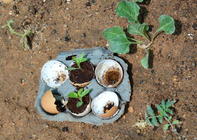Organic farming is the process of using environmentally friendly farming methods to improve soil health, to protect the environment and to ensure human health.

Farmers use traditional and modern farming methods and combine it with research to ensure a balance into nature’s ecosystems. Organic farming therefore means using natural and environmentally friendly methods and materials.
No chemical fertilizer and pesticides or herbicides are allowed. Organic cultivation is aimed at creating a healthy environment, healthy food and healthy consumers.
If the environment in which agricultural products are grown is healthy, the product will be healthier and consumers will also be healthier and have a better immune system.
Organic farming differs from biological and conventional farming. Biological farming is environmentally friendly and, if possible, uses organic fertilizer, but producers occasionally add some nitrogen (N) to the soil to improve the health. The fertilizer is sometimes of chemical origin.
Conventional farming is when agricultural methods are used which only aim at obtaining the highest possible yield. If a lot of herbicides, pesticides and fertilizers are applied and mainly one type of crop is planted, it is called conventional farming.
How to Create Biodiversity
With organic farming, different crops are planted together to create a greater bio-diversity (bio = life, diversity = variety). The organic producer must have as many different types of living organisms as possible on his farm – a variety of insects, birds, small predators and mammals and also a large variety of plants.
If this system - called an ecosystem - is not balanced and there is too many of one kind of animal it can become a plague.
For instance, when owls are eradicated on the farm, mice might become a plague as there are no natural predators to control them.
Examples of organic farming practices include crop rotation (not planting the same crop every year in the same soil), the planting of certain plants and flowers that attracts biologic predators (insects which feed on pests) and the use of natural pesticides to fight diseases and pests.
How to Start Organic Farming
A farmer who wants to start organic farming should have knowledge of the following:
What is expected of an organic farmer?
Which products are allowed or prohibited in organic farming.
Which agricultural methods are used in organic farming and why.
How to register / certify as an organic producer.
How/where to market organic products.
The organic farmer must first obtain a copy of the new South African organic regulations and then decide whether to be certified as an organic producer or just farm organically. Certification can be done by Afrisco, a South African organic certification body accredited under the IFOAM (International Federation of Organic Agricultural Movements) standards. A fee will be paid and an inspector will annually conduct inspections. Producers certified organically receive a registration number from the certification body and they can sell their products under the specific certification body’s logo.
Accordingly, they are protected by law and registered as organic producers. A producer does not need to certify his entire farm organically and does not have to certify all his crops, but there must be a clear difference between certified organic and conventional crops.
There is a transition period at the beginning of organic farming. It is the time it takes to switch from conventional farming to organic farming and is determined according to organic regulations. The transition period is two years for annual crops such as vegetables and three years for perennial crops such as fruit trees and vineyards.
Translated by Ananda Schoeman